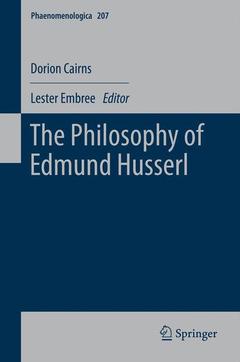Description
The Philosophy of Edmund Husserl, 2013
Phaenomenologica Series, Vol. 207
Author: Cairns Dorion
Coordinator: Embree Lester
Language: English
Approximative price 105.49 €
In Print (Delivery period: 15 days).
Add to cartPublication date: 11-2014
310 p. · 15.5x23.5 cm · Paperback
Approximative price 105.49 €
In Print (Delivery period: 15 days).
Add to cartPublication date: 10-2012
310 p. · 15.5x23.5 cm · Paperback
Description
/li>Contents
/li>Biography
/li>Comment
/li>
The present volume containing the dissertation of Dorion Cairns is the first part of a comprehensive edition of the philosophical papers of one of the foremost disseminators and interpreters of Husserlian phenomenology in North-America.
Based on his intimate knowledge of Husserl?s published writings and unpublished manuscripts and on the many conversations and discussions he had with Husserl and Fink during his stay in Freiburg i. Br. in 1931-1932 Cairns?s dissertation is a comprehensive exposition of the methodological foundations and the concrete phenomenological analyses of Husserl?s transcendental phenomenology.The lucidity and precision of Cairns?s presentation is remarkable and demonstrates the secure grasp he had of Husserl?s philosophical intentions and phenomenological distinctions. Starting from the phenomenological reduction and Husserl?s Idea of Philosophy, Cairns proceeds with a detailed analysis of intentionality and the intentional structures of consciousness. In its scope and in the depth and nuance of its understanding, Cairns?s dissertation belongs beside the writings on Husserl by Levinas and Fink from the same period.
1. The Transcendental Phenomenological Reduction: Husserl's concept of the Idea of Philosophy.- a. Appendix to Chapter 1.- 2. General Nature of Intentionality.- 3. General Structure of the Act-Correlate.- 4. Thetic Quality.- 5. Act-Horizon.- 6. Founded Structures.- 7. Direct and Indirect, Impressional and Reproductive, Consciousness.- 8. Evidence.- 9. Fulfilment.- 10. Pure Possibility.- 11. Recapitulation and Program. 12. The Egological Reduction.- 13. Primordial Sense-Perception.- 14. Primordial Sense-Perception (Continued).- 15. The Founding Strata of Primordial Sense-Perception.- 16. The Constitution of Immanent Objects, and the General Nature of Association.- 17. Spontaneity in General Attention.- 18. Doxic Explication.- 19. The Ego-Aspect of Evidence and the Evidence of Reflection.- 20. Syntactical Acts and Syntactical Objects.- 21. The Eidos and the Apriori.- 22. Value Objects and Practical Objects.- 23. Conceptualization and Expression.- 24. The Transcendental Ego.- 25. The Transcendental Monad.- 26. The Other Mind and the Intersubjective World.- 27. Conclusion.
Dorion Cairns (1901-1973) studied at Harvard, studied three and a half years with Husserl, and taught 1953-1969 on the Graduate Faculty of Political and Social Sciences at the New School for Social Research.
Lester Embree (1938- )studied with Cairns at the New School and holds an endowed chair at Florida Atlantic University.
Unique insight into the philosophy of Edmund Husserl
Required reading for students of phenomenology
Informed editing by one of Cairns’s own students




